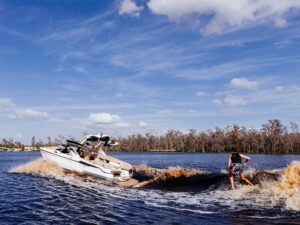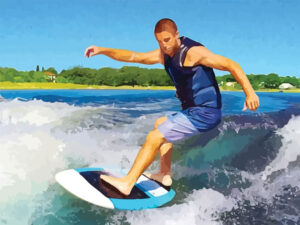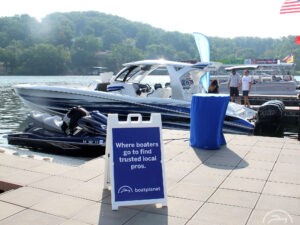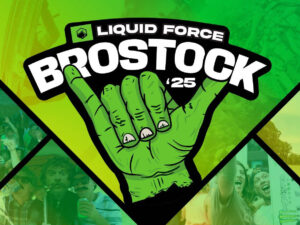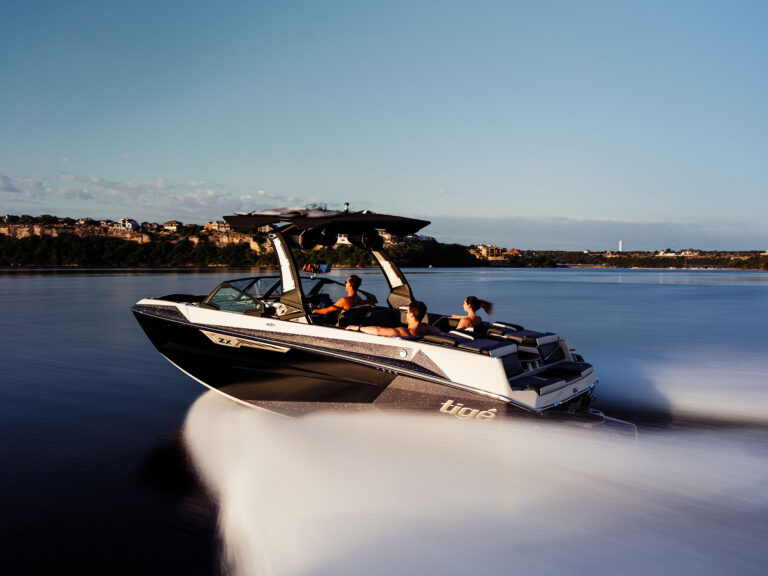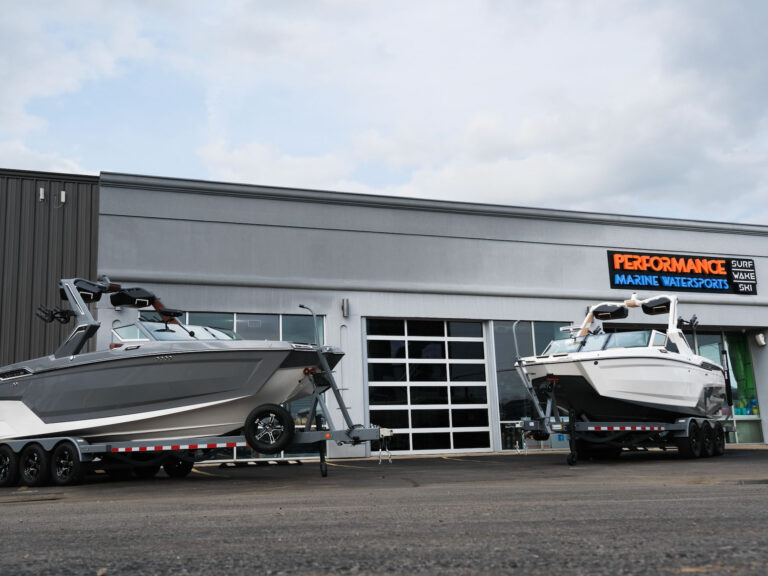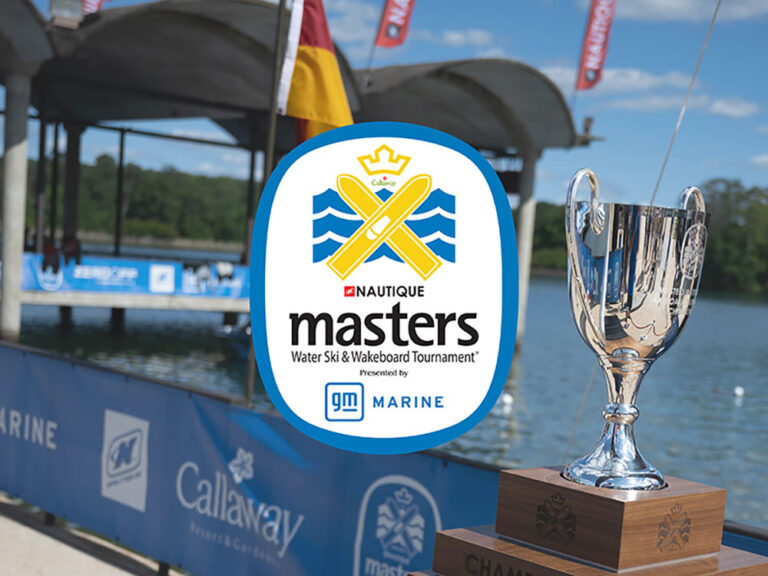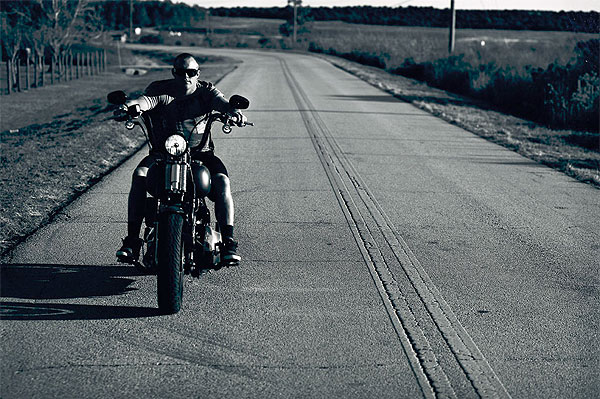
Words: Danny Hampson | Photos: Bryan Soderlind and Jason Lee
“My passion for wakeboarding changed my life,” Rusty Malinoski says while we fly down his winding driveway in his golf cart. It really stuck with me. Rusty and I are binaries when it comes to our place in the industry, but this passion is a shared feeling, a common ground we both stand upon, appreciating where the rope and handle have taken us. No matter what type of rider you are, this passion is something you can relate to — the consuming desire to get out on the water.
I will admit to having preconceptions about Rusty going into this interview. We’ve always been friendly toward each other, but having never spent time one-on-one, I didn’t know what to expect. After all, the guy’s body exemplifies the term “beefcake,” and Rusty himself will admit if you see him before a Pro Tour final he gives an impression that is less than accommodating. But after spending a day at the
Malinoski compound in Clermont, Florida, I was surprised to have these preconceptions reversed. I’m not saying the things I’d seen and heard weren’t true, because they are. Rusty does love to win wakeboarding contests; Rusty does have an aggressive approach to his riding; and Rusty does have an unwavering focus to carry his vision out on his terms. (I like how he turned the tables at one point and started interviewing me.) The thing that changed my perspective was seeing his motivation for these aspects of his personality. I realized that the passion runs so deep within Rusty that it can become misconstrued for a different meaning than a pure love for the sport and simply being the best he can be.
I also learned Rusty is not the guy a nickname like The Bonecrusher would lead you to believe. He has an appetite for fun that is insatiable, a love for his family that is contagious and an obsession for wakeboarding that is inspiring. When you get to the bottom of Rusty’s character you learn he’s not a guy who wants to crush bones but a rider who is crushing stereotypes to become a new breed of personality and an icon in wakeboarding. You can’t judge a book by its cover, and when you open up Rusty, there’s a lot to find inside.
Most of your career has been unconventional, including your start in the sport. You’re from Canada and you didn’t live on a lake. You could’ve gone in many different directions, like hockey or motocross. What motivated you to pursue wakeboarding?
I grew up in a super small town, and that’s what we did: BMX, motocross, hockey — every kind of sport, we were into it. But the very first time I tried wakeboarding, it was different. I don’t know what it was but that very first time, it consumed me. It was all I wanted to do. It wasn’t ever about could I do this as a profession, could I make money at it, could I land tricks? Hockey could’ve been an option. I was getting pretty good at motocross, but all the love I had for everything else was directed at wakeboarding.
When you first got sponsored, were you just riding because you were good or was winning events something you were interested in?
Winning, for sure. Growing up, you start on the motocross track and you’re lined up with 40 guys and the goal is when that gate drops, you finish first. It’s the same with hockey. You’re a team. You want to score goals. You want to win. I guess that carried over in my wakeboarding. I would ride at home. I was getting better, and I felt so motivated to get to a contest and put myself up against other guys to see if I could win.
You’re very unapologetic about being competitive. Do you think being outward with that nature makes other riders look at you in a different light?
It’s human nature, whether you admit it or not, to want to be the best you can be. One of the greatest feelings is winning an event or being the best guy that particular day, when everything worked out for you and you won. You get that feeling with freeriding as well when you’re getting really close to a trick that you’ve wanted to land and then it happens. That’s another amazing feeling. I’m in this to be the best wakeboarder I can be, and I work really hard at that. Looking back now at the way my career has gone, I am totally happy and I’m excited to keep going with it. I’m 27 now, and I feel like I’m the best wakeboarder I’ve ever been. So I look forward to the future, for sure.
You were earning your spot as one of the best as you got married and had a kid. That’s pretty unheard of in our sport. Talk about the impact on your world as a result.
I always wanted to be a young dad. I met my wife and everything was falling into place. It was the right move for me. I was 23 when we had Marek, pretty young to be learning to manage my riding and my career in unison with raising a baby. We created a routine to keep things in order. It was a change for me going from no real structure, just doing whatever I wanted, to having a lot more responsibilities, a family to take care of. Life is more real than it’s ever been. I’m going to ride for my family and provide for them, do the best I can. Now Marek is 3 and he’s so much fun. Every morning, every night, no matter what kind of day or how I did at an event, I have so much more for me at home with my family. Life is not just tunnel vision on wakeboarding. Don’t get me wrong, I’m still massively driven, but I can turn it off and on a lot easier now.
One of the biggest assets you have as a rider is your work ethic. How has that been an asset to your career?
Growing up in a small community, my dad was just working. It was the way I was brought up. You got up and you went to work, that was the deal. I guess, for no other reason, that’s the way I am. I believe no matter what I would be doing, I would work really hard at it. Even if it’s cleaning the garage, I do a good job. I’ve always been like that — keep the house clean, wash the cars — it’s just the way I am. But in wakeboarding, people don’t realize I’m actually not as naturally talented as the guys I’m competing against. That’s why I ride four to five times a day. I don’t have a choice. I have to work harder for it.
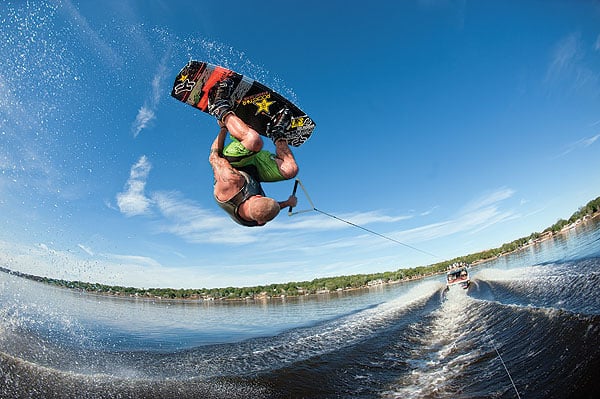
It’s pretty well-known that you take better care of your body than a lot of other guys in the sport, as far as off-the-water training. Do you feel that is a big asset to being able to sustain your style of riding?
Through high school I was working out to be fit and strong for motocross and hockey. It wasn’t like, “Oh hey, I should work out and maybe I won’t get injured.” It was just a no-brainer to me to just keep working out.
People seem to think of you as a contest specialist. It almost overshadows the fact that you actually put out video parts nearly every year and have more editorial coverage than almost anyone.
I would agree that most people look at me and say I’m a contest rider. But when I’m out riding, there’s not a certain trick I’m trying to get 100 percent consistent for an event. I try to get consistent and the best I can be just for my wakeboarding. Did I work really hard to get the 1080 consistent to land in a contest? For sure. But aside from everything else, I try to push my riding to do tricks I haven’t landed. For instance, the 1260. Danny Harf has done it once. That’s a goal of mine, not so I can do it in a contest but so I can do it for myself because I think I can. Whether it’s for a video section, a sequence or possibly one day to land it in a contest, that doesn’t enter my mind at all. It’s just something I want to do. When I’m filming video sections, I definitely try to do the hardest tricks I have that maybe aren’t consistent or take certain tricks bigger and into the flats, for sure.
People started to think of you as a contest rider after that crazy streak of Tour wins in 2007. Before that, you were known as a freerider, getting sequences. Do you think all those wins made people have that misconception about you?
I guess you would have to think that. It’s a bonus to win an event, and it’s always a better feeling to get on the podium than to get knocked out in the first round. But in no way am I riding in the freezing-cold water right now training for a Pro Tour that’s three and a half months away. I’m riding because I love wakeboarding. My wake is the biggest I’ve ever hit, and I have more fun wakeboarding than anything else. That’s what does it for me, not thinking: “OK, four months until the first Tour stop. I’ve got to get my tricks dialed.” Here’s a question for you, Danny. You’re a wakeskater, but looking at wakeboarding, what was your first impression of me?
The first time I saw you was at Wakestock in Toronto. I didn’t really know you too well. I saw you in the hotel lobby and you grabbed someone’s T-shirt and ripped it right off his body. I just thought you were a big, kind of intimidating guy.
People assume I’m like that. But people who know me well know that I’m always up for shenanigans, having fun and goofing around. But by your first look at me, wouldn’t you think that’s what I’m like?
People try to stereotype you. People think you’re this big, scary guy, like with The Bonecrusher nickname.
That was all Dano Amir, the Pro Tour announcer. I had no part of it.
Do you like the nickname?
Not really. Do I care? No.
So, do you think the media portrays you as an overly serious guy?
No, but if you only see me five minutes before I ride at a Pro Tour event, you would totally think I was just no-personality, so-serious, gotta-win guy. Because I do zone out; I am focused. Nerves are running, and I’m thinking about what I’m going to do. You see me 30 minutes later, though, and it’s totally different. Let’s hit the beer tent, tell stories and have fun — maybe rip T-shirts!
What do you want to be remembered for in wakeboarding? Is there anyone you look at and think “I want that kind of career?”
I just want to be able to do this for a while. Someone like Shaun Murray, he’s 34 and still super good at wakeboarding. He can come to a Hyperlite shoot and still be the best rider out there. I think that’s really cool. I want to keep myself on that level for a long time, and I want to be able to be that guy who is still good enough to be on the podium at events, getting editorial and video sections and, more than anything, being happy as a rider — not washed up and bitter.
